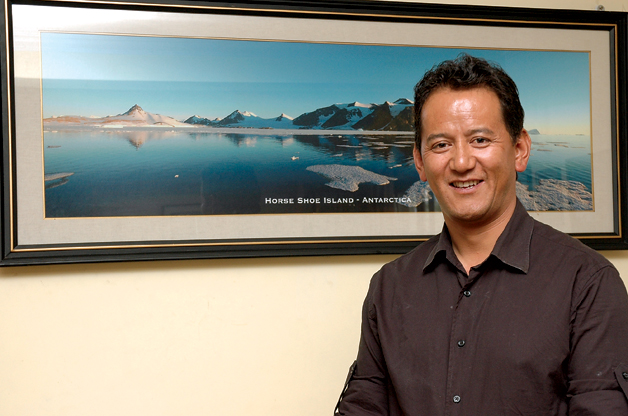 Tashi, grandson of the Tenzing Norgey Sherpa who accompanied Edmund Hillary to the
Tashi, grandson of the Tenzing Norgey Sherpa who accompanied Edmund Hillary to the
summit of Mt Everest, does not exude the sophistication that one expects to come from someone born with the Tenzing tag. His demeanor is very much similar to a common Sherpa: welcoming, friendly and forthright. But that is just a first impression. It only takes Tashi to share his life experiences before you realize that the Tenzing element still prevails over his personality, all the more starkly due what he has achieved on his own over the years. “What my grandfather Tenzing Norgey accomplished has always been a source of inspiration and admiration, but people give me respect as an individual also for what I’ve earned through personal efforts,” says Tashi.
He has stepped on the summit of the Everest three times and has worked with Australian Antarctic Division at Mawson Station researching for nine months. Occasionally he gets invited by large companies to speak on diverse subjects, deliver motivational lectures and share his knowledge on environmental issues. “I had a vision of what I wanted for myself, and rather than merely dream about it, I applied certain discipline in life and worked step by step to achieve it,” he says.
Born to the eldest daughter of Tenzing Norgey, Tashi grew up in Darzeling, went to Delhi for higher education and landed up in Australia to start a career and a business that he still operates from Nepal. Though he spent greater part of his life in India and Australia (where he married an Australian), it is Nepal, he says, “Where I feel at home.” He adds that a lot of Nepalis who have lived abroad and learnt things, have a hidden urge to come back and do something for Nepal. “I could have continued my business from Australia or simply taken the best and headed for the West. But the desire to give back kept raising its head until I packed my bag and set out to the land where I really belong,” says Tashi.
Two things that he wants to do are: make Nepal a respected destination and attract well paying clients by offering services that meet their expectations through his company Tenzing Asian Holidays; and engage in charity work to support the efforts of organizations and individuals working for the benefit of the poor.
“The tour and travel agencies offering low quality services at cheap rates have lowered the bar and damaged the reputation of this beautiful country, which otherwise has the potential to become a best holiday destination in the world,” says Tashi, expressing disenchantment over poor regulation and unruly agencies. “With my experience of living abroad, I have a fair idea of what foreigners expect and I pass on the knowledge to my staff, always living up to the promises we make,” he says with the conviction of a professional.
When he is not doing business, Tashi loves to help out those in need. He goes around giving free lectures at schools for the underprivileged, takes part in campaigns for good causes or just
manages to be there where his presence matters. He has joined others in helping set up a school in Nuwakot and is planning to start a coffee plantation there very soon. “People in that region do not have steady income and they have a hard time just feeding their family,” he says. Then he continues in a concerned voice: “Sending their children to school is a distant dream for many.” He can’t uproot all the problems that haunt these people, he says, but a steady source of income will certainly ease the pressure they are dealing with every day.
Tashi also has coauthored a book entitled: Tenzing Norgey and the Sherpas of Everest. The Sherpas and Himalayas inevitably figure in all discussions you have with him. Talk about the receding ice cap on the mountains, including Everest, and deteriorating Sherpa tradition due to the intrusion of foreign cultures, and his replies force you to rethink your zealous approach towards change. “You can’t blame just one factor like tourism for the snow melting in the mountains. It’s a global phenomena and a lot of factors contribute to it.”
Having said that we should not stop doing what we can to prevent the situation from getting worse, he goes on. “Whenever my team goes on an expedition, for example, they make sure that no waste is left behind.” He agrees, though, that the foreigners are a lot more conscious about not adding to the waste than our own kinfolk. And, about Sherpas discarding their traditions for foreign ways, Tashi thinks that it is because youngsters spend less time with their family and, therefore, don’t learn to respect the culture they are born into.
“I still have the memory of my growing up years, which hasn’t been faded by the many years that I spent abroad. That might, in fact, partly explain why I feel closer at home here,” he says. He has started to catch up on what he missed all this while. “I try to learn traditional Sherpa dance whenever an occasion permits. I get a little nervous following the steps, but it pleases my wife when she sees me making an effort to do something which I should be doing naturally,” says Tashi. And when he says that, do you notice so much as a hint of sophistication? No. After all he is the Sherpa of the Himalayas.










